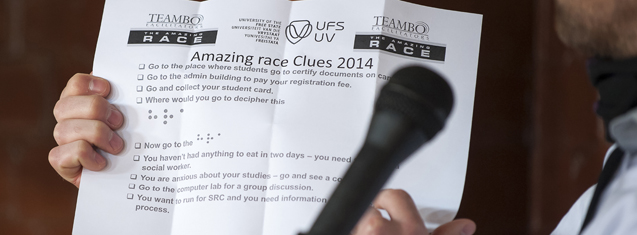Latest News Archive
Please select Category, Year, and then Month to display items
12 January 2024
|
Story Nonsindiswe Qwabe
|
Photo Sonia Small
 Since joining the UFS in 2008, Dr Grey Magaiza has worked extensively on approaches that can foster the socio-economic transformation of societies.
Since joining the UFS in 2008, Dr Grey Magaiza has worked extensively on approaches that can foster the socio-economic transformation of societies.
“The future should be one where communities can decide on their development agenda and futures. That’s the most important for me.” Dr Grey Magaiza, Deputy Director of the Centre for Gender and Africa Studies (CGAS) and Head of the Community Development programme on the Qwaqwa Campus, is passionate about capacitating communities to be agents of change and advancement. His vision for the future emphasises the empowerment of communities to take charge of their development by actively participating in decision making and the implementation of development projects that can improve their lives.
Since joining the UFS in 2008, Dr Magaiza has worked extensively on approaches that can foster the socio-economic transformation of societies. Over the years, he has crafted his research speciality into one that he is most proud of – being an interdisciplinary scientist immersed in the development of communities.
“I’m in a fortunate position of researching what I like. I say ‘fortunate’, because I’ve taken the time to understand what I’m passionate about, which is the overall field of rural livelihoods and livelihood futures – in short, community development. My research starts from an engaged university, understanding the elements that a university must use to enhance transformation and relevance to its immediate community in terms of development.”
One of the ways he has done this is by looking at social entrepreneurship as a development approach for young people in a rural setting. Through workshops with non-profit and civic organisations in Qwaqwa, Dr Magaiza has been helping these organisations to map out their needs and actively meet them through the involvement and support of external role players.
“We understand that communities are part of the national development agenda, but even that national agenda respects community knowledge and intentions and allows communities to shape their identity. A critical enabler of this is community organising. You bring back the capacity in communities to have dialogues on issues affecting them as spaces for engagement, knowledge exchange, and for people to just talk about their way forward.”
By enabling communities to define their development agenda, they can address their specific needs, challenges, and aspirations, he said. “When I look at livelihood futures, it’s quite an exciting aspect of my work – it’s like looking into a fortune tellers’ globe, because you’re not deciding for communities what they should do, but the communities themselves take those decisions.”
Staff experience running in the shoes of students
2014-07-29

Photo: Sonia Small
From having to upload money on a card and buying lunch at Thakaneng Bridge to naming the SRC members, some UFS staff members got to experience life as a full-time student on our Bloemfontein Campus.
During their 2014 Purpose Summit on 22 July, staff from Student Affairs competed against each other in an Amazing Race.
“We got to see how students actually run around on campus each day,” said Elize Rall from Residence Life. “We always hear from parents how their children have to go from one place on campus to the other to get things done … and now we know what they are talking about.”
Staff who attended the summit was divided into teams during the morning’s practical session. Similar to the popular television programme, The Amazing Race, there were quite a few checkpoints – often with some formidable challenges and quizzes.
To make their tasks even more difficult, the participants were forced to take the route students with disabilities would have taken. This means: no stairs could be climbed and no curbs could be jumped – they could only use ramps and elevators.
"The experience was extra-ordinary," said Lerato Masapo from Residence Life. "I learned a lot and I didn't realise how difficult it was for our disabled students to move around the campus.
"What struck me the most was the distance between every building and how far the students had to walk to reach certain places. This made me realise the importance and responsibility on us as staff members to know our environment and assist students accordingly in that regard."